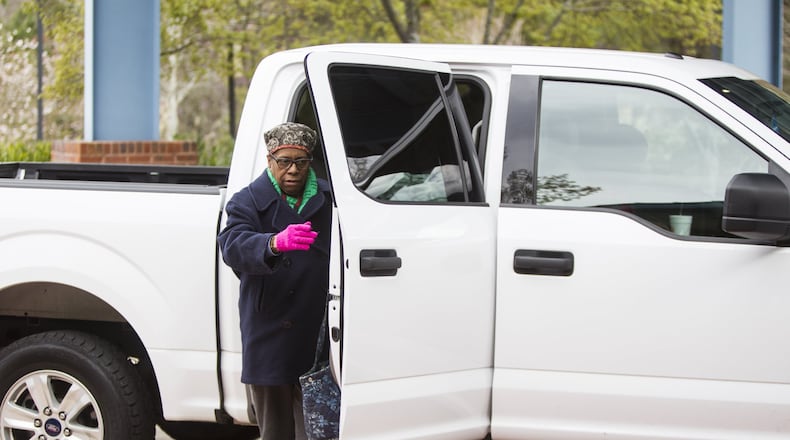Getting older comes with its challenges: it can be harder to drive, to cook, to clean. It can get lonely.
With an over-65 population that's expected to go from 10.5 percent of the metro Atlanta population in 2015 to 20 percent in 2040, according to the Atlanta Regional Commission, there is even more demand from residents to help them navigate the issues that come with age. With help, experts say, older residents can stay in their homes longer. It's better for both the elderly and their communities.
VIDEO: WSB-TV’s People 2 People
Local governments provide a lot of the support that helps older residents get to doctors appointments or gets meals delivered to their homes. But with a population that’s quickly getting older, the demand already outstrips the supply, and some agencies are looking for creative solutions to serve more people.
“It’s just going to mushroom,” said Becky Kurtz, director of the Area Agency on Aging and manager of the Atlanta Regional Commission’s Aging and Independence Services group.
By far, the most requests for help in the region come from seniors who need rides, she said. Local governments offer rides to senior centers and doctors’ offices, and in some cases, to buy groceries or run other errands.
In Fulton County last year, the waiting list for transportation services was stalled at 1,800 people. The county stopped adding names to the wait list because no one came off of it in 2016.
Since then, county workers called everyone on the waiting list, said Pamela Roshell, the director of Fulton County Senior Services. Some were eligible for transportation through Medicaid or the Department of Veterans Affairs. Others were no longer interested in the service, weren’t really eligible or didn’t need the help. Some had died.
There are now fewer than 700 people waiting for rides — still a long list, but far fewer than there had been. Additionally, Fulton is expanding a pilot program that covers rides for seniors from ride-share companies, like Lyft and Uber. Residents will pay $1 per ride, and the county will pick up the rest of the tab.
The ability to get around isn’t the only problem governments are trying to help solve. In DeKalb County and others, residents can get help with cleaning or personal care, and a respite program gives breaks to full-time caregivers. The county also provides home-delivered meals for vulnerable seniors. In Gwinnett County, home-delivered meals can also include food for pets, to make sure that they eat. And Fulton County offers home repair, so seniors can get grab-bars installed in their showers, or get help with other small fixes.
The services local governments offer are designed to help keep people healthier, Kurtz said. If they are well-fed, and have good nutrition, if they have help vacuuming or bathing, they are less likely to fall or to end up in the Emergency Room, she said.
“A lot of these things can be prevented if social services are in place ahead of time,” she said. “The need for it outstrips the supply.”
In DeKalb, more than 300 people are on separate waiting lists for home-delivered meals and in-home services that help them change light bulbs and pay their bills on time. Most Fulton wait lists have at least 200 people who need services, with more than 500 people waiting for help with cleaning, and other homemaker needs. All together, Fulton served 2,751 people with non-transportation services, while 1,382 still waited for help. In Gwinnett, fewer than 100 people are on non-transportation waiting lists.
The need to wait for services can mean that family members have to help fill in gaps, Kurtz said, or that seniors sometimes go without the help they need.
“Some are going to have to make do,” she said. “It can be a real challenge for folks.”
Blake Hawkins, the deputy director of the department of community services in Gwinnett County, said that county’s services are intended to address food insecurity and other needs for residents who may be struggling.
“It’s in our best interest to provide as much as we can, to let seniors age in their homes as long as they possibly can,” he said.
Without the additional help, Roshell said, seniors are vulnerable to being institutionalized. It’s less expensive for people to stay in their homes, she said, and people feel better when they are able to stay in communities where they have friends and other relationships.
Roshell said she is looking for other opportunities to expand services to residents who aren’t getting the help they need. Maybe home-delivered meals will take on an Uber Eats model, or college students who need affordable housing would be willing to have older roommates who need companionship and an extra hand.
“Knowing we can’t solve all their needs, we’re prioritizing the needs we really do address,” she said. “People want to be as independent as they can as long as possible. When you can help them achieve their goal of being active and engaged and part of the community, it’s a very important part of county government.
Throughout metro Atlanta, call 404-463-3333 for help with finding senior services.
MYAJC.COM: REAL JOURNALISM. REAL LOCAL IMPACT.
The AJC's Arielle Kass keeps you updated on the latest happenings in Fulton County government and politics. You'll find more on myAJC.com, including these stories:
Never miss a minute of what's happening in Fulton politics. Subscribe to myAJC.com.
About the Author
Keep Reading
The Latest
Featured




